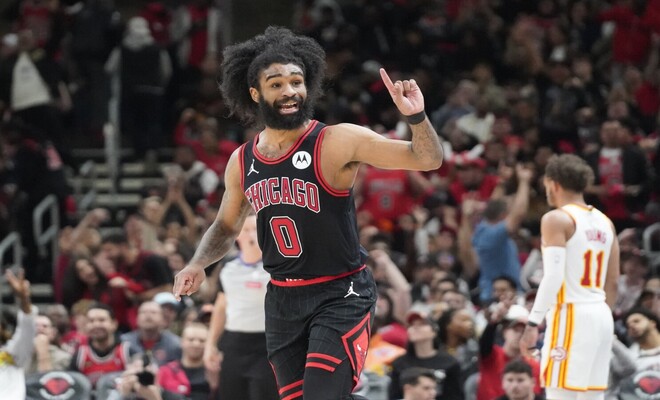-
 June 3, 2025, 12:25 pm
June 3, 2025, 12:25 pmLast Updated on August 19, 2025 7:34 pm by André Lemos | Published: June 3, 2025
The mushy middle is the last place you want to be in the NBA, and unfortunately that’s the space the Bulls have occupied a few years running. With an aging, expensive roster failing to deliver results, the Bulls let DeMar DeRozan skip town over the summer and opted to deal away Alex Caruso for Josh Giddey rather than a bushel of future picks. With Zach LaVine looking to rebound and and little other change to the roster, Bulls fans didn’t have a ton to get excited about heading into the year.
How’d It Go?
Given the lack of major structural changes the Bulls made, the first half of their season actually went quite well. LaVine looked like his typical self after missing most of last season, performing like a borderline All-Star with his trademark bounce back in spades. Nikola Vucevic turned back the clock and was putting up some dominant performances, delighting fantasy GMs in the process. Lonzo Ball’s remarkable comeback was completed as he returned to the court after a couple years on the shelf with knee injuries that truly looked career-ending.
Despite all those positives, the Bulls were clearly not a real postseason threat, and still had too much talent — a motivated LaVine was doing some serious damage — to really bottom-out and fight for the top lottery spots. Coby White and Ayo Dosunmu both stepped up, especially when Ball dealt with injury troubles early on. While LaVine’s play delivered a few too many wins, it did wonders to rehab his trade value. His desire to be traded was no secret but he put his head down, played ball and went to work — pretty much the only process that would result in a win-win for both LaVine and the Bulls. He was dealt to Sacramento, which was definitely not an upgrade as far as “playing for a contender” goes, but it did help Chicago clear the books for the future even if it didn’t steer them into the draft lottery.
The Bulls were unable to find a taker for Vucevic despite his great start and decided to extend Ball, so it was a quiet deadline for a team in obvious need of a refresh. The real coup of trade season was LaVine’s departure opening up a space for Josh Giddey in the spotlight. He was Chicago’s big pickup over the summer and faced a ton of scrutiny given that the front office chose to trade away one of the league’s most coveted trade chips in a one-for-one deal. The Bulls passed up on multi-asset packages, including draft capital, to swap Alex Caruso for a guard coming off a disappointing season in which he was played off the floor in the playoffs. No pressure.
Luckily for the Bulls, Giddey took off down the stretch. He looked like the dynamic shot-creator the team envisioned acquiring, and brought some surprising scoring chops to the table as well. Giddey was constantly in triple-double territory and finally gave Chicago someone to pin some hopes to. Coby White paired well with Giddey and also benefited substantially from LaVine’s departure, rising to the challenge as a primary scorer. Rookie Matas Buzelis also supplanted Patrick Williams — who disappointed yet again — and while the Bulls’ season ended with a whimper in the Play-In, they were at least able to see some positives from guys on the right side of 30.
Coaching
Billy Donovan is a known quantity at this point and while the Bulls have failed to emerge as a playoff threat in recent seasons, it’s well understood that Donovan is a coach — not a miracle worker. The team’s shortcomings largely fall at the feet of weird roster construction and salary allocation, and while Donovan isn’t without his faults, the lack of postseason success can be attributed to other things far more impactful than his coaching. Whether or not Donovan can lead a better-built team to more success is a better question, but not one we’ve been able to get an answer to.
In the big picture, this season featured a few notable positives from behind the bench. First and foremost, Donovan was able to get enough buy-in from Zach LaVine to coax out a half-season of solid play that eventually benefited the player and the organization. Not every former All-Star would respond that way after trade requests had been made, and while LaVine gets credit for his professionalism, it’s also a two-way street.
Secondly, Donovan did well to juggle a messy backcourt rotation, spreading the minutes across a deep guard group while keeping everyone happy and engaged for the most part. That’s a hard needle to thread when the front office paid a heavy price to make Josh Giddey a core player while also satisfying LaVine, Coby White and Ayo Dosunmu, who all had claim to important roles, plus making space for the return of Lonzo Ball, who earned a look after a grueling rehab process. Additionally, Donovan gets some credit for swapping Patrick Williams and Matas Buzelis in the starting lineup. Donovan was not beholden to Williams despite a five-year, $90 million contract and simply made the choice to slot in a better player even if that made the front office look bad before the ink on the contract was dry.
If anything, you could argue that Donovan is doing a nice job turning this roster into more than the sum of its parts. That he can get this group to the Play-In year after year is probably damaging to the Bulls in the long run; they overachieve their way out of the lottery but don’t go anywhere meaningful. He isn’t the problem in Chicago, but it was surprising to see him get a contract extension. Quantifiably better coaches get fired for much better results than what Donovan has delivered with the Bulls.
The Players
Nikola VučevićC, Boston CelticsSeason Team GP GS MPG FGM FGA FG% FTM FTA FT% 3PTM 3PTA 3PT% PTS REB AST STL BLK TO 25-26 BOS 58 49 29.7 6.6 13.1 50.0 1.3 1.5 83.1 1.6 4.3 37.3 16.0 8.8 3.5 0.6 0.7 1.4 24-25 CHI 73 72 31.2 7.5 14.2 53.0 1.6 2.0 80.5 1.8 4.4 40.2 18.5 10.1 3.5 0.8 0.7 1.6 23-24 CHI 76 74 34.3 7.7 15.9 48.4 1.4 1.7 82.2 1.2 4.1 29.4 18.0 10.5 3.3 0.7 0.8 1.6 ADP: 55.2/41.4 (Yahoo/ESPN) | Total Value: 21/12 (8/9-cat) | Per-Game Value: 32/17 (8/9-cat)
Vucevic was a smashing success for fantasy managers, and an even bigger one for managers who were able to work the trade phones. His on-court decline hasn’t led to any major slippage in the box score just yet and the departure of DeMar DeRozan plus a glut of pass-first guards on the roster pushed Vucevic back into a primary scoring role. He was sensational to start the season, sporting a ridiculous .587 shooting percentage through his first 25 games and posting first-round value into December. It was an obvious sell-high opportunity but by that point, Vucevic had been good for long enough to ensure that he would blast past his ADP.
The other shoe was always going to drop and Vucevic reverted to the more-expected top-50 form from the All-Star break onward, with a seven-game absence due to a calf strain slowing his roll. Still, getting the guy you were expecting on draft day after a couple months of elite value is nothing to complain about. Managers that were able to find someone willing to pay for Vucevic at his peak must have made out like bandits, flipping a first-rounder at the time for someone who likely outproduced Vucevic through the end of the campaign. The obvious nature of the sell-high might’ve made that difficult, however, and it’s not dissimilar to what Chicago faced in the real world. The Bulls couldn’t find any suitable trades to get Vucevic off the books, which isn’t a great endorsement of how teams view him or his contract even after that great run of play, but he was able to fend off decline in fantasy for another season.
Josh GiddeySG, Chicago BullsSeason Team GP GS MPG FGM FGA FG% FTM FTA FT% 3PTM 3PTA 3PT% PTS REB AST STL BLK TO 25-26 CHI 40 37 31.2 6.2 13.4 45.8 3.7 4.9 76.4 1.8 4.8 37.2 17.8 8.2 8.4 1.0 0.4 3.6 24-25 CHI 70 69 30.2 5.3 11.4 46.5 2.5 3.2 78.1 1.5 4.0 37.8 14.6 8.1 7.2 1.2 0.6 2.9 23-24 OKC 80 80 25.2 5.0 10.6 47.5 1.3 1.6 80.6 1.0 3.0 33.7 12.3 6.4 4.8 0.6 0.6 2.1 ADP: 67.7/84.8 (Yahoo/ESPN) | Total Value: 36/52 (8/9-cat) | Per-Game Value: 44/58 (8/9-cat)
The Bulls made Giddey their big offseason move, swapping him for Alex Caruso in a one-for-one deal that suggested management felt the Bulls were closer to contention than the general public. That made Giddey’s start to the year uncomfortable to say the least, as he had to constantly fend off legitimate challenges to playing time from Coby White, Ayo Dosunmu and Lonzo Ball while flanking Zach LaVine. Even though his rocky 2023-24 was in the rear view mirror and he was with a team prepared to lock him into a featured role, Giddey was just outside the top-100 in 9-cat leagues through the All-Star break, failing to do much different from his OKC days. After the break, however, Giddey went on a monster tear that likely decided some fantasy leagues.
Giddey was a top-5 player in 9-cat leagues over his last 19 games, averaging 21.2 points, 10.7 rebounds, 9.3 assists, 1.5 steals, 0.8 blocks and 1.9 3-pointers on .500 shooting from the field and .809 from the charity stripe. What’s more, Giddey did that while playing with a torn muscle in his right palm for a month. The departure of LaVine and the season-ending injury to Dosunmu pushed him into a true go-to role and Giddey responded with a run of play that rewarded management’s faith. It’s the kind of stretch that makes you reconsider what you thought about Giddey’s fantasy prospects, and if Chicago gets this version of Giddey regularly they’ll have the right to take a big victory lap. Some skepticism is warranted between the sample size and the circumstances, but the big finish completely changes the tone of Giddey’s first year in Chicago. There’s another gear that nobody could’ve anticipated.
Want access to the rest of this Season Wrap? You’ll need to have a FANTASYPASS membership. Click here to learn more and sign up!
